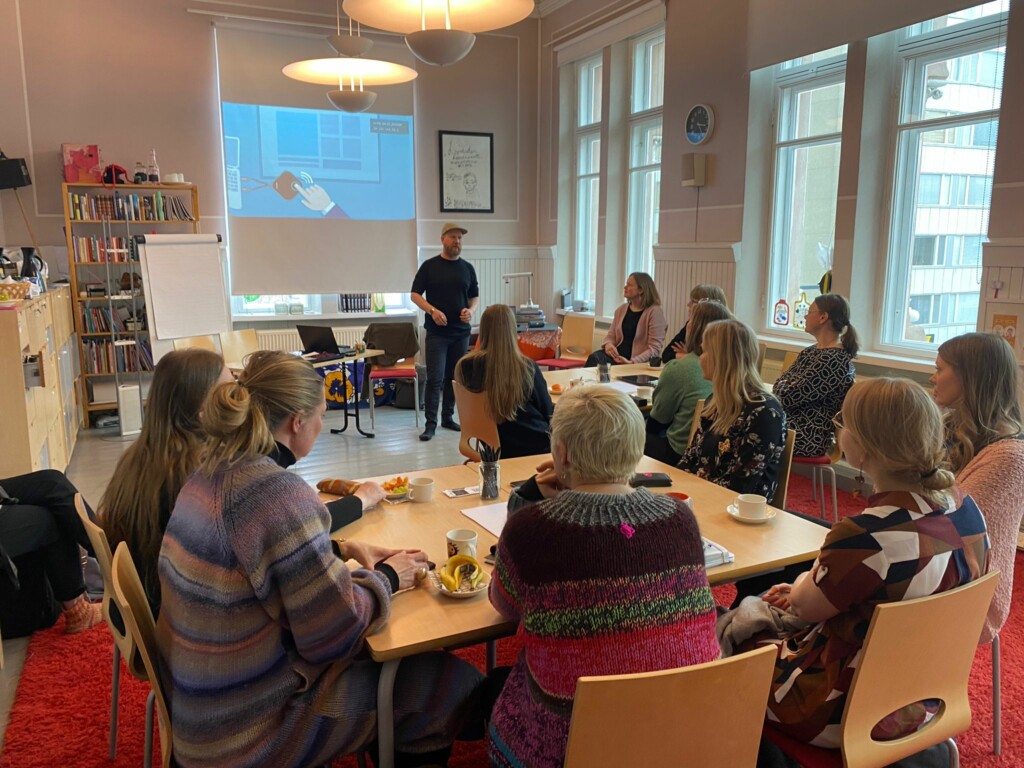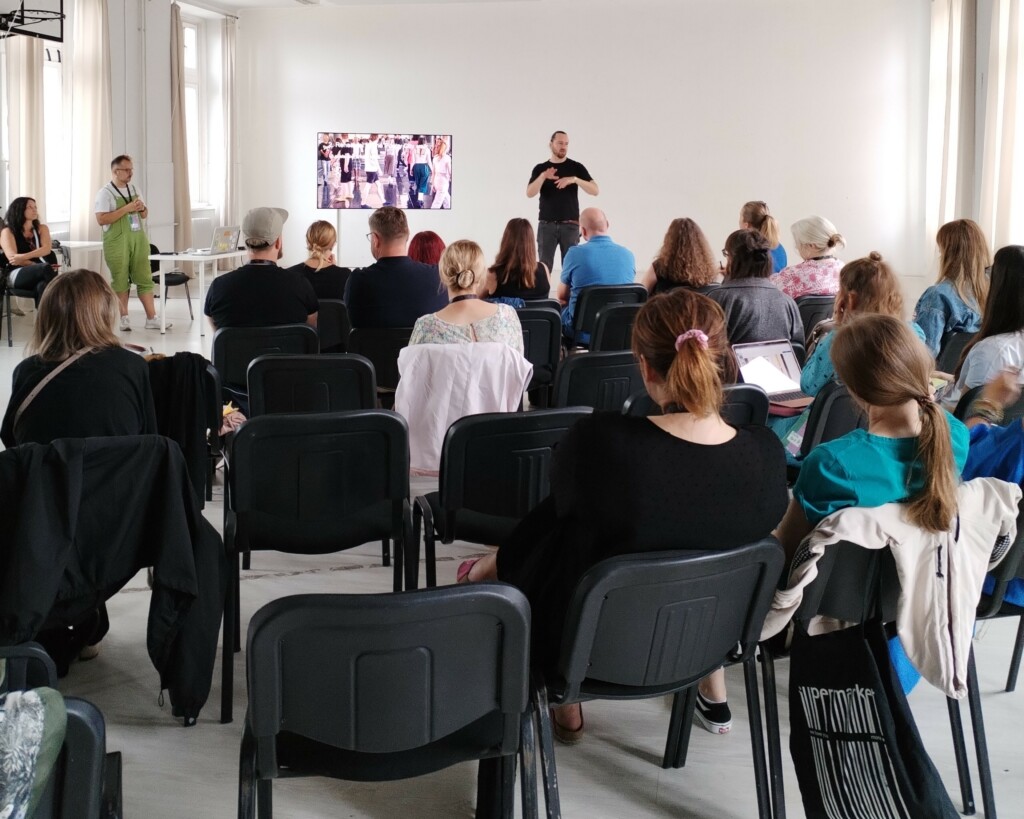Inspiring international collaboration through poetry
The Poets of Today – Voices of Tomorrow (PoT-VoT) project, a three-year collaboration that explored the power of contemporary poetry to engage young people and strengthen communities, has recently concluded. The project, which brought together partners from Finland, Slovenia, Hungary, Poland and Serbia, showcased the importance of creative collaboration and the role of poetry in education.
For the Association of Finnish Children’s Culture, the project was more than just a chance to explore poetry. It was an opportunity to connect with actors in the arts and culture and education fields internationally, strengthen its partnerships, and leave a lasting impact on the communities involved.
This blog post will look at the factors that create the best conditions for a successful project. We interviewed our project partners at the last project meeting in Ljubljana, Slovenia, and asked them about their experiences during our joint project.
Communication is key to successful collaboration
The emphasis on open and constructive communication was seen as a key factor in overcoming challenges during the project. When the project began in 2022 most of the project partners were unfamiliar with each other. Urša Strehar Benčina from Pionirski dom, the leading partner of the whole project reflected on this aspect, stating, “The most important thing about overcoming all issues in a collaborative project is communication. This is something that I think we should do even more—to take our time. When we don’t have the time, actually, it’s the best time to stop and discuss.”
There was also much to learn from the different expectations, approaches, and perspectives of the different partners. Recognizing and working through differences became an important part of the collaboration, offering insights that could help fine-tune and optimise future projects. All partners took on the challenge of working with new partners, target groups and previously unknown art forms realising that the moving parts require meticulous planning and the willingness to hear different needs.
The project worked on two levels. On a national level, there were tasks like training sessions, events, and school visits. On a transnational level, shared activities, such as producing project publications—two books exploring contemporary poetry and its methodology—and performances by an international poetry collective.

Gábor Csaba Márton from Pro Progressione noted that the focus often remained on national tasks, while the poets themselves might have gained more from opportunities for direct international exchange. The national poet groups, each consisting of ten poets per project partner, worked together and created partnerships with one another that continue to this day, in addition to the partnerships formed with the teachers and schools involved in the project.
With partners from different countries and working styles, there were moments when expectations were not aligned and needed adjustment. The emphasis on open communication and adaptability helped overcome these hurdles. Creating space for honest discussions ensured that everyone’s needs and perspectives were considered. This collaborative approach not only resolved challenges but also strengthened the relationships between partners, making the work feel more unified and impactful.
“The Finnish team’s support and structure made it easier to handle challenges. They helped us adapt and keep the focus on what we wanted to achieve together.”
Urša

Making poetry accessible and engaging
At the heart of PoT-VoT was the idea of making poetry accessible to young people. One goal was integrating contemporary poetry into classrooms in ways that were both practical and inspiring. Teachers were given new tools and methods to engage students, while students were encouraged to explore poetry as a means of self-expression.
For many young participants, poetry became a way to share their thoughts and emotions, breaking the stereotype of poetry as an intimidating or outdated art form. The poets, educators, and cultural experts worked together to show that poetry could be both meaningful and fun.
“We managed to break the stereotype of who can be a poet. After the project, students have been participating in a new social awareness campaign, where they create podcasts with the poets. A spark has been lit!”
Gábor, Pro Progressione
Teachers also benefited from the guidance. By bringing poetry to the classroom, new ways to connect with students and spark meaningful conversations about creativity and critical thinking were found.

Partners were very proud of their achievements during the project, each emphasising different elements. For Arteria foundation, the visual elements and the poetry city walk where the highlights. “We showcased innovation with our poetry walk, blending live performances by poets with virtual tours. This integration of multimedia and physical events inspired audiences and collaborators alike” told Anna Ochmann, the chairwoman of the foundation. Overall they were proud of the way the Polish team managed to achieve its goals but also to push boundaries, offering fresh ways to experience poetry. For Pro Progressione, the highlight was to witness the progress their poets made with their courage to perform and speak about about their craft whereas Heartefact from Serbia was left proud of the way they managed to bring together more familiar art forms with poetry which was a new field for them.
A lasting impact
The PoT-VoT project created meaningful change for all those involved. Students found new confidence through poetry, teachers gained tools to engage their classes, and poets were able to connect with local communities in new and meaningful ways. The Association hopes that these outcomes will serve as a foundation for continued collaboration and growth, building on the connections and ideas raised during the project. The project also reinforced the importance of linking arts, education, and broader societal needs.
“Teachers gained practical tools on how to add contemporary poetry to their curricula and also new connections between different cities. The teachers found new ways to connect with students and their emotional development through poetry.”
Gábor, Pro Progressione
“The students from the schools had created a poetry show after the visits, which shows their enthusiasm towards poetry. The show was out of the students’ motivation, not for grades. In the show, the students combined poems from different ages, old with the more contemporary and also Serbian team’s leading poet Radmila’s poems.”
Aleksandra Lozanovic, Heartefact
Looking ahead
The Association of Children’s Culture in Finland has established itself as a reliable and thoughtful partner in international collaborations. Long-term collaborators, like Pionirski dom in Slovenia, spoke of the Association’s role in helping them think strategically about their work and develop structures that extend beyond the impact of projects.
Urša reflected on this partnership, stating, “We moved from being an institution that just implements to one that also thinks about policy making and structures that can support our work. You are a very important partner for us in thinking more structurally about what we do and positioning ourselves.” She also noted the Finnish team’s ability to carefully recognise and respond to partners’ needs, adding, “It’s important that you recognise the needs we have and match us with partners who have similar goals and values.”
This thoughtful matchmaking approach, combined with the Association’s extensive network of 36 cultural centres, has proven valuable. By listening carefully to its partners and aligning goals, the association has created strong collaborations that work well for everyone.
Another strength noted by Urša was the continuity of working with the Association “With continuity, we can say, ‘Remember, we did this before,’ which makes communication easier. Trust is not just about being confident we’ll do what’s needed—it’s about reliability and accountability,” she explained. This trust and familiarity make even challenging work feel more manageable. As the PoT-VoT project concludes, the Association of Children’s Culture in Finland is already looking toward the future. Whether connecting the arts with health, well-being, or other sectors, the Association’s team remains committed to using arts and culture to create meaningful change.

